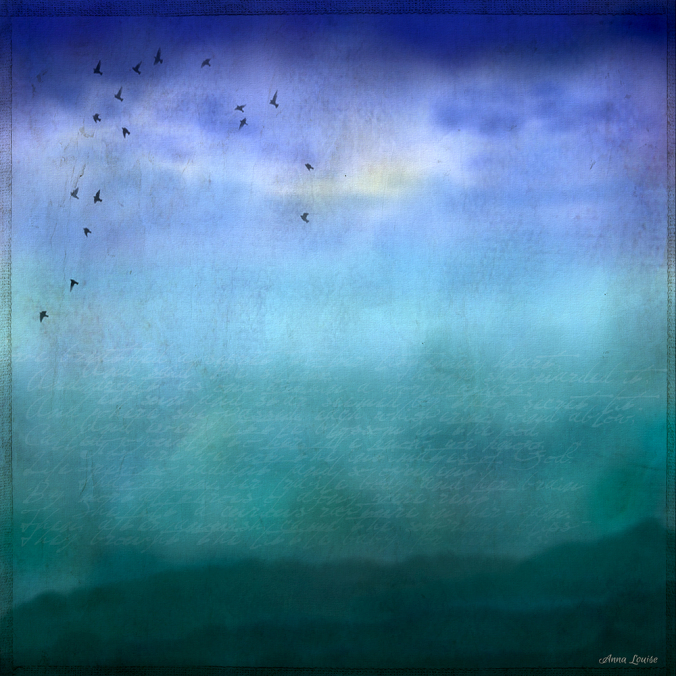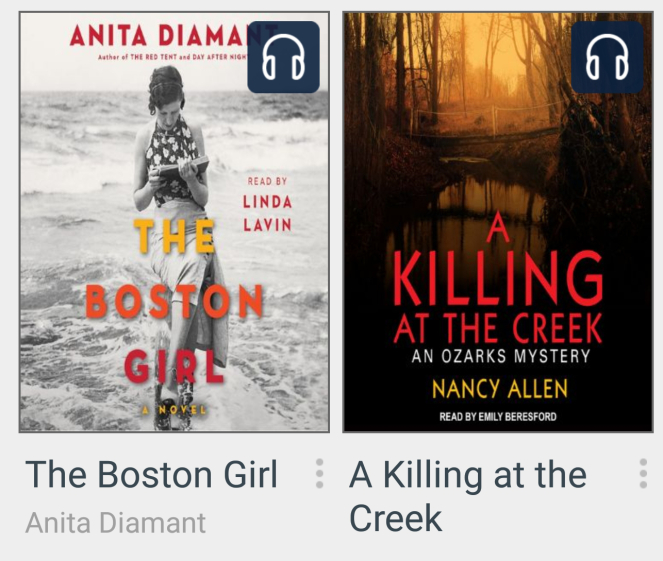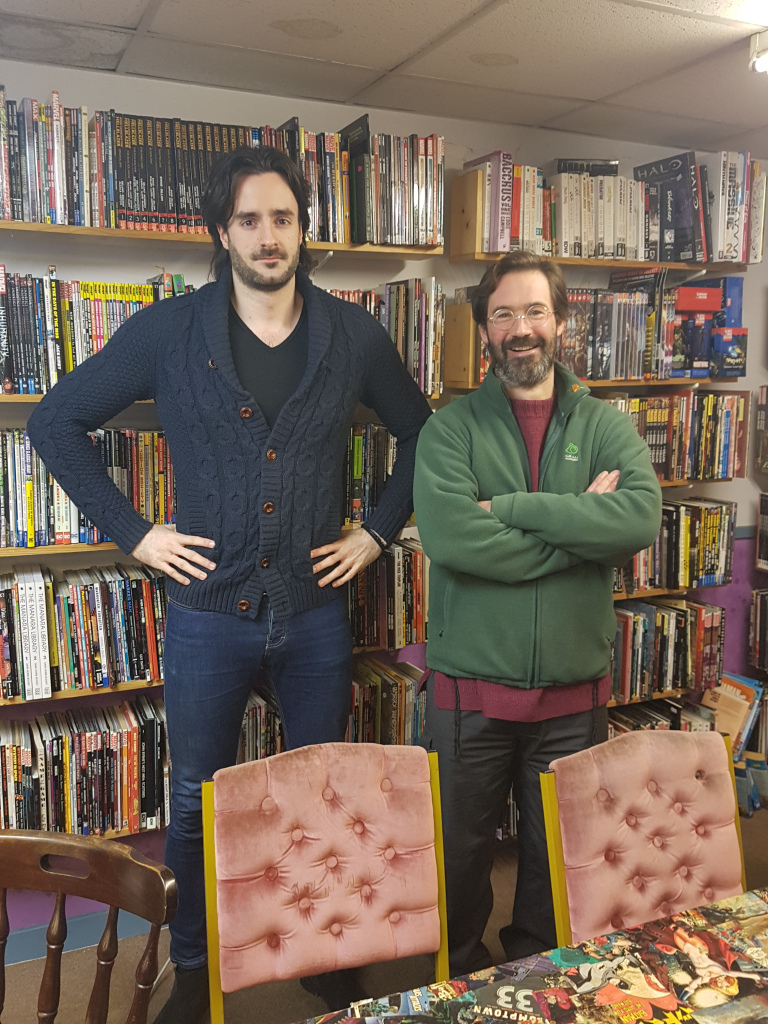 James Oswald (Right) with Ryan O’Sullivan (Left).
James Oswald (Right) with Ryan O’Sullivan (Left).
From writing one of the best selling crime fiction series, to writing a fantasy series about dragons and magic, Scottish author and livestock farmer James Oswald has created two completely different novel series’ that offer bold and rich takes on their respective genres. For those who aren’t familiar with his work, Oswald is something of a self-publishing success story. He began by publishing the first two novels in his, now Sunday Times bestselling Inspector McLean series, online by himself. The books proved to be so popular that he was snapped up by UK publishing company, Penguin.
Just recently I got the chanced to sit down and chat with Mr Oswald at a recent signing event that took place at Asylum Books and Games. From the outset, James is warm and incredibly easy to talk to, and I find his story of becoming an author incredibly interesting. During our interview we talk about his journey to success, and the inspirations behind both of his series’.
“So I am going to start with an introduction. Could you just tell me a bit about yourself and what it is that you do?”
My name is James Oswald and I write crime fiction. The Inspector McLean series of crime books set in Edinburgh, and I have also written a fantasy series, The Ballad of Sir Benfro, which is dragons and magic and all sorts of wonderful nonsense. Also; in my spare time, I am a livestock farmer. I grow highland cows and sheep.
“So, I heard that your first novel ‘Natural Causes’ was actually self-published. Could you tell me a bit about that process, how it came about and why you chose to publish it by yourself?”
Yes, I did the first two in fact. Natural Causes and The Book of Souls I self-published. I first wrote the books over ten years ago now. 2006, is when I think I wrote Natural Causes and it was shortlisted for a thing called the crime writers association debut dagger award, which is an award for an unpublished novel. I thought debut dagger was very well regarded within the industry, publishers always look at the shortlisted books – and publishers looked at the book and they said, “It’s really well written but there is no market for what you have written, which is crime fiction with a twist of the supernatural in it”, so publishers wouldn’t pick it up.
Then my second novel The Book of Souls was also nominated for the debut dagger award the following year, and again, I had the same problem with publishers. They said, “You can obviously write, you’re a very good writer, but we don’t know how to market this kind of book, so we are not going to publish it“, and I spent about five years putting it around publishers, and eventually took over the family farm, I was to busy to write anymore and send things out, and someone pointed out to me about the Amazon kindle, this was about 2012, and self – publishing. So, I thought, “well I’ll give it a go”. I didn’t expect much from it, but I did hit upon the idea of giving away the first one for free for a while in the hope that people would pick it up for free, and enjoy it enough to pick up the second one. I thought I might sell about a thousand copies of the two books together over the course of a year. It turned out a little better than that! The first one sold, I think, it was being downloaded, at one point, fifty thousand copies a month, and I only self-published the two of them for eight months. By which time, publishers had said there was no market for this sort of thing, and then they all queued up to buy the rights to publish them professionally, and at the end of those eight months I had shifted three hundred and fifty thousand copies of the two books. Which is just astonishing. And, it hasn’t really stopped since. Penguin, who are the publishers who picked up the books in the end, got the first two out really quickly because they had already been written, and built up a lot of interest in them on the back of my self publish success. Natural Causes was actually picked for 2013’s Richard and Judy Book Club’s Summer Reads, and it won the readers pick that year, and I was shortlisted for the National Big Awards Debut Author, and half a dozen other things as well. Which was just completely bonkers, having spent years and years getting nowhere. Suddenly it all just happened like that.
“Would you say that there are any advantages and disadvantages to self-publishing your own work?”
The advantage is that it is really easy to do. Anyone who can write can self-publish. You can get yourself a cover made for very little money, or you can try and do it yourself, though, usually the results are not very good if you are not very good with photo shop or whatever. You know, you don’t have to edit your book, though it is a good idea to pay someone to edit it, but you can put out an e-book for nothing and charge 99p for it, and make a bit of money for it if people buy it. The problem is, millions and millions of people do it, so you can get lost in the crowd now. Even when I self-published five years ago, it was getting that way, and it is even worse now. What a publisher can do, they spend money on really good looking covers, they have professional editors who know the business really well, can help work with you to make the book as good as possible, they have proof readers who can get rid of all your spelling mistakes. You don’t want to know how many bad spelling mistakes I missed in Natural Causes. The other thing that they can do is get the books into book shops and supermarkets, which if you are only selling as an e-book, you can basically only sell them through Amazon. Or, possibly Apple I-book store or Kobo and The Nook, but Amazon have something like 80 percent of the e-book market. So you might as well just concentrate on Amazon. They are absolutely massive. I mean, they basically created it when the brought out the Kindle e-book reader, they created the Kindle publishing platform, which allowed people to upload their own books and make these available, and that kick started the entire industry, it was an amazing thing, the making of my career, so I am all in favour of it, but it’s very hard work. If you want to be a successful e-book author you have got to write the books, edit the books, market the books, and you have basically got to maintain a high online social media presence to keep people aware of you, and to be successful at e-books you need to keep the coming. The best way to sell books is to bring new ones out. Every time I bring a new one out all the back issues get a sale boost because people come back. Even if they are not the same series people buy the new one, and it has an advertising kick for all the other books.
So, the most successful e-book authors are probably publishing four, five or six books a year which is, well I can’t write that fast….I am considered to be prolific writing two books a year, but a lot of the e-books are quite short and can be quite formulaic, but readers like that. They like the familiar. The same character coming up, doing pretty much the same thing, maybe a different villain each time, or whatever, and people love that, and I am not going to knock them for it.
“Okay. So you started off as publishing your own books and now Penguin publish your books. What are the main differences between self-publishing and working with a publisher?”
Well Penguin do a lot of work to make my books better basically. Working with an editor is the main thing. So, I send my first acceptable draft of my book, which is usually about the second or third draft, to an editor and he reads through and comes back with detailed notes about the plot, where it works, where it doesn’t work and suggestions on how to change it and whatever. I then go and take that on board, make changes, come up with another draft and send it back to him, and if he’s happy with that and thinks it is good enough, he will then pass it on to the proof reader who will check it for typos and inconsistencies. In one of these books, I think it is Dead Man’s Bones, where my Inspector has to go to a physiotherapist because of something that has happened to him in the previous book. At the beginning of the book the physiotherapist is called Esmeralda and at the end of the book she is called Ermantrude. Just because I had forgotten, and I was typing, it was just a silly throwaway name. The proofreader picked up on that, which saves me the blushes of having got it wrong, and people emailing me and saying this character’s name has changed. So, that is the sort of thing, structural thing, that an editor can do. Then the whole package, the cover design, and the marketing. They will send books out to reviewers, book bloggers and the newspapers, and they will get me interviews with newspapers and stuff. I have the BBC coming to film me on my farm next week, which is something that my publicist has managed to organize. That is something that Penguin can do, because they are a big organization with lots of money to throw at these things. Where is if it was just me self-publishing on my own, I wouldn’t have a chance. You know, I could phone up the BBC, and they would go, “Who?”, and I could send books to the newspapers for reviews, but I would have to pay to get them printed and send them all out myself. So, that is what a publisher can bring to the deal. They take most of the money as well. That is the downside! Whereas with an Amazon e-book, as long as you are selling it for more than 99p, you get seventy percent of the cover price. If you are selling it for two pounds, you’ve got a pound forty sale. If I was selling it for seven pounds ninety-nine, which is the price on the Penguin cover here, I would be getting whatever is seventy percent of that price. I can’t do the maths because I am an art student. Don’t ask me to do maths! But it is a lot of money. Whereas I get ten percent, so I got 70p or 80p for each book that they sell. Sometimes it is less than that if they are discounting them. Supermarkets will negotiate very large discounts and sell these books for half price. I won;t get 80p for each half price book, I will probably only get 50p. Instead of getting of getting 3 pounds fifty for an e-book, I am only getting 50p or 80p. But,they will sell many, many more copies. That is just how the business works. The other thing that Penguin did to buy the rights, they paid me a large sum of money up front which was nice, so I could go buy a new tractor.
“So, as a novelist, what inspires you to write? Or what has inspired your stories?”
The weirdest things, as I am not very much a plotter. I just take ideas from the news or odd conversations with people. I mean “Prayer For the Dead”, I had a twitter conversation with Ian Rankin, oddly enough, because he said that he thought the names of Scottish country dances would make really good crime fiction novel titles. You know, things like, The Dashing White Sergeant and Strip the Willow, and I came up with dibs on Strip the Willow, because I thought that would be a brilliant title. It was just a joke, a throwaway joke, and then I got thinking about Strip the Willow. It is a progressive dance where you can go down the line, so you could have a progressive murderer. You could have someone murder someone, they could take that identity, and then use that identity to get close to someone else and then murder them, and then takes on that new identity. So it is like a progressive dance. That was kind of the idea, the seeding idea behind the book. So, it was just the stupidest throwaway conversation that just squirreled away in my head and then sparked something, and there is a little story like that behind most of these books. I just love taking a tiny idea like that and worrying at it, and worrying at it. You know, if I did this, or I did this, and what would happen next, and then how would they react if I did this. I am just constantly asking myself questions, and that is what ends up being a novel.
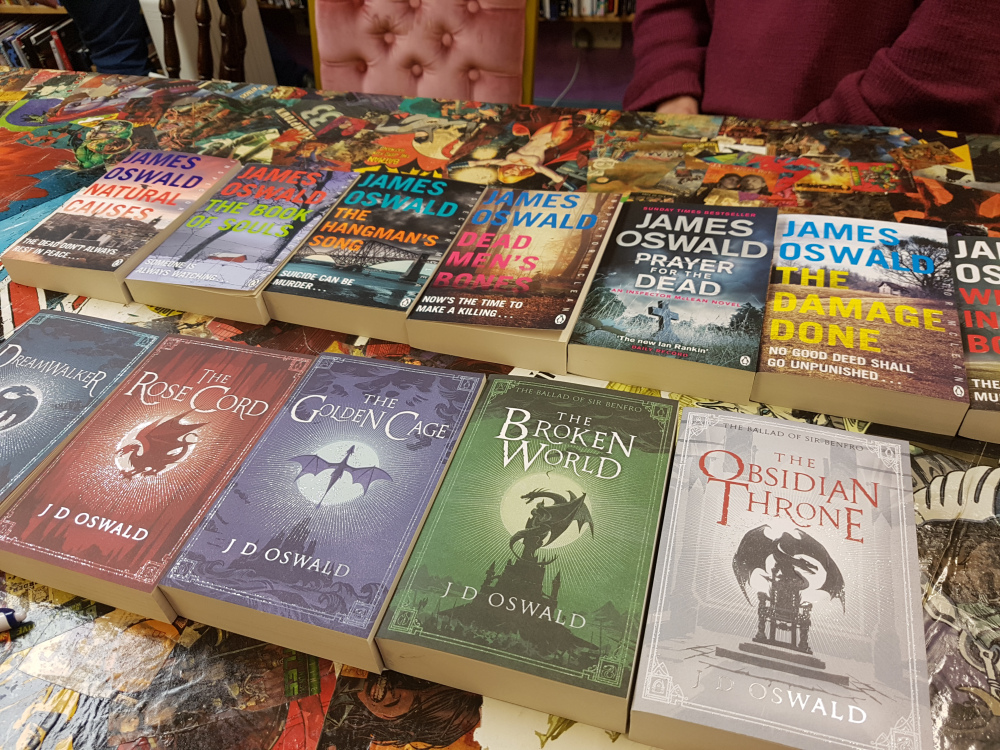
“So, you are here with both your Inspector McLean and The Ballad of Sir Benfro series’, and I was just wondering if you could tell us a bit about both of these series?”
Well The Ballad of Sir Benfro series, the fantasy books, actually weirdly enough came first. I wrote the first three of those before I wrote any of the Tony McLean books, but the character Tony McLean goes back to the early nineteen nineties when, as I was saying before when we (James, Mike McLean, owner of Asylum Books and Games etc) used to make a fanzine, and Stuart McBride was one them as well. I wrote a comic strip that I was originally going to find an artist in Aberdeen for, and then I thought, I will send this to 200AD comics. They didn’t buy it, but there was a support character in that called Tony McLean and he is a policeman in Edinburgh, he could see ghosts and nobody else believed him, but he could see these ghosts wandering around the streets. So, that was kind of the seed for Tony McLean as a character. It wasn’t until much later that I started trying to write series crime fiction that I resurrected this character, and fleshed him out a bit. When I wrote the first one, Natural Causes, I didn’t know there would be more, more and more of them. I just loved the idea of a policeman, someone who is trained to be rationale and logical and uncover clues and stuff. What happens when he is investigating something and all the evidence is pointing to the fact that this person is actually the devil incarnate, on earth causing mischief, and is also very powerful and can rain down shit upon him if he makes life to difficult for him? The basic story behind Natural Causes is they uncover the remains of a dead young woman who has been ritually murdered, and then walled up in an old house in the city. They work out that this was 60 years earlier, and as the house is being redeveloped they uncover this grizzly scene, and the question there, which becomes obvious through the story, is that the ritual was meant to summon a demon that would grant immortality. The question is, did it actually work? Did the demon grant immortality, or did the people doing the ritual just believe it would work? I love that question slightly ambiguous, and little things like that are the backbone of the Tony McLean series.
The Ballad of Sir Benfro Series is completely different. It is pure magic, dragons and fantasy affair. A completely made up world. It was completely inspired after I spent ten years on a research farm in Mid-Wales, before I came back to Fife to take over the family farm. I started to learn the language and I was living in the middle of nowhere, in the middle of the countryside in Wales. One of the mountainest countryside, forestry forever, and sheep and cattle research, and learning the language and reading things like the Mabinogion, the Welsh myths and legends, which is the route of the Arthurian legends. There was just so much material there that I just started weeding it into a fantasy, I was totally inspired, and the dragons speak a language which is called Dragioth, which is basically Welsh, and the notable humans that are in the books are all named after different Welsh sheep breeds, because I was working on a research farm with different Welsh sheep breeds.
It was all a bit of a joke at the start, that then grew into a quarter of a million words there that is in front of you, and I loved doing it. I love that sheer invention of fantasy. With the crime books, you are constrained a certain amount. Even if I’ve got supernatural stuff woven in there, you are constrained by police procedure and the day to day worlds. You can’t have anything too outrageous, as it is happening in the real world. Whereas with this (The Ballad of Sir Benfro), you could have these down-trodden dragons that don’t breathe fire, but do speak, and they have adventures. You can have men that can wield powerful magic that can conjure blades of fire that will cut through anything. You make this stuff up, and it is great. As long as you keep a consistent logic to it, that runs through the whole series, anything goes, and I love that freedom.
“Obviously, as you were saying, they are both completely different genres. One is fantasy and the other is crime fiction. How did you balance the two different genres?”
I found it actually really, really useful, because by the time I had written four of those in a row, which was round about the time Penguin picked up the fantasy series, I would be writing scenes where Inspector McLean would be having an arguement with his boss, and I would be like, “Hang on a minute, I have just written this scene….oh no, that was when I was writing the last book”. Everything was getting muddled up in my head, and I was also getting a little bit bored with the character. Then my editor at Penguin asked if I had written anything else, and I told them that I had done this fantasy series where I had written the first two books, before giving up halfway through the third book, because I wasn’t getting a publisher and I wasn’t getting anywhere them, and I had put them to the side to start writing the Inspector McLean series. Then my editor read the first two and half and loved them and wanted to publish them. I was like, “Great. Brilliant. That means I need to remember what I was writing”, because it had been ten years since I had giving up writing them, and I had to pick up the story. It did then mean that I could write some of this series and then go back to the Tony McLean Series. So mixing up the genres was really useful to clear my head, like a palette cleanser for each course, as it were, to do something completely different.
“So, the fantasy genre seems to be pretty big at the moment, especially with works that involve dragons, such as Game of Thrones. What is your opinion on the fantasy genre at the moment and where do you think your work fits in there?”
Well I hope it fits in a new Netflix series. A five part series!……..I have no idea, really. I mean, I love fantasy, but I don’t have time to read as much as I would like, so I am not on a lot of current stuff. Obviously, I am aware of Game of Thrones, I read the first book and loved it, looked at the rest of them that were available, and looked at them and thought, “I haven’t got time to read these!”. I watched the first series and really enjoyed it, and then my books started to kick off and I had hardly any time to watch any television. However, I am aware of what is happening in fantasy. The Ballad of Sir Benfro series is very traditional fantasy, perhaps with a little quirky edge, with the sheep and stuff like that. It is very traditional sorcery stuff, but there is so much unusual stuff coming along. Grim dark things happened as well, which is more gritty, realistic fantasy. As much as fantasy can be realistic! Which I love as well. Basically, I love anything that is well written. So, I think that my series would fit into the very traditional line of fantasy. I mean, my influences are obviously Tolkien, everyone is influenced Tolkien, and David Eddins, that sort of fantasy. Robin Hobb, I am hugely influenced by Robin Hobb. Rather than the more cutting edge piece of fantasy that is going on. Like Peter Newman, who is absolutely brilliant, with the first one called ‘The Vagrant’, which is a brilliant, brilliant book. That is a very different kind of fantasy, it has got elements of steampunk going on his books, which I don’t really have going on in mine, as they are definitely agrarian society which makes it nice and easy to do. Then you just throw in some magic and superstition.
“So, the next question is kind of the same, but for your Inspector McLean series. What is your opinion on the crime fiction genre at the moment, and what do you think the Inspector McLean series offers fans?”
Well, the easy thing is the supernatural twist, that very few authors are allowed to do. I know lots of them who want to, even after the success of these books, publishers are still very wary of publishing a crime book, a detective book, or a thriller, which turns out that a ghost did at the end. That’s a very stupid way of describing it, but that is how they see it. You set up a whodunnit, with a really different and complicated plot, and you’ve got people thinking, “oh my god how is he going to work this out. How could all of this happened. Oh, a ghost did it? Well, that’s a bit crap”. Honestly, that would be really crap, if that was how the story was structured and ended. It’s like the idea, that you as an author have written yourself into a corner and the only for you to find your way out of this corner is to, “And he woke up and it was all a dream”.
I mean crime fiction is the biggest genre. The biggest sales. The biggest superstars are all writing thrillers, and things that fit in the big crime umbrella, and the interesting thing is that horror as a genre has almost entirely disappeared. All the good horror writers are writing crime now, because horror is just crime with a supernatural twist at the end of the day. I dislike the whole genre compartmentalization, and mixed things into my crime books. I mean, these are technically what they call police procedural’s. The other label that they get labelled with are tartan noir, another one that I dislike, because there are a lot of very good Scottish crime fiction authors, obviously there are Ian Rankin and Val McDermott and Stuart McBride. I could go on and on because there are hundreds of them, and we all get together at Bloody Scotland at Stirling every year, and get horribly drunk as we are all best mates, but someone came up with this term tartan noir, and the media love it because it is easy to say, but I don’t know what tartan noir is. Technically noir, the subgenre, is where nobody wins at the end basically, and most of this tartan noir, especially in my detective books to a certain extent, has a triumph at the end. Inspector McLean usually either finds the bad guy, or works out what the crime was, or locks someone up, and then we go onto the next one. So it isn’t really noir from that one point of view, but I don’t know, they seem popular anyway. I have sold a million books.
“Which is really good. Especially considering you started off by publishing them yourself”
I have got seven out, and number eight is coming out next January. Then you have another two under contract, and then a new series will start. So, busy, busy.
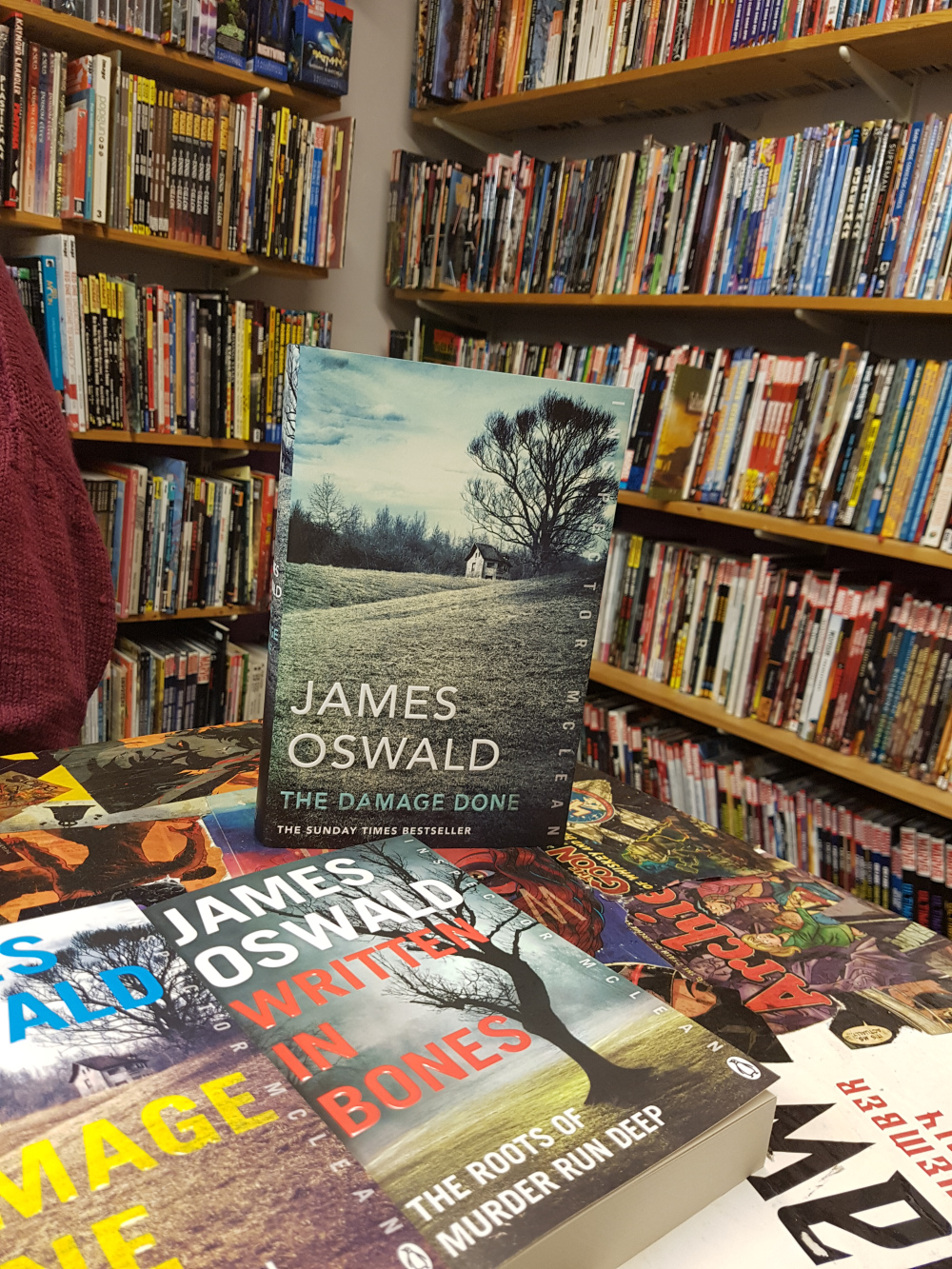
“Without spoiling too much, could you maybe say where you kind of want to take the next book?”
The next book in the series, which is coming out in January, is called The Gathering Dark. Again, it is an investigation that starts of with a horrific lorry crash in the centre of town, and the main thrust of the story seems to be investigating and trying to identify the victims, because the crash kills a lot of people in the centre of Edinburgh. As Tony McLean looks into this and why the truck crashed, he digs up all other nasty things going on. I don’t want to give too much away, there is another character going through the book who is a survivor of the truck crash, and they have to find him. It’s actually, weirdly enough, inspired by the first story that I wrote the comic strip on that I sent to 200AD nearly thirty years ago, which was where Tony McLean first appeared and then I finally got to write it in the end, but over time has changed.
My books are not just sort of an investigation, there is a lot of character work, there is Tony McLean’s home life going on in the background, and then at the end of this latest one (Dead Man’s Bones), we discover that his girlfriend is pregnant, so that is going on, going forward, and what is going to happen with the child being born and how that is going to change his life. So, in some ways, the books are just one big long soap opera that seems to be quite popular. So the new one will be out in January, and I am just slightly worried, because when I wrote the comic script thirty years ago, a truck crash in centre of Edinburgh was horrific, yes, but it wasn’t politically loaded. Now, you either have terrorists using trucks as weapons of mass destruction, or the other thing that I am slightly worried that may take me to task about, is the Glasgow bin lorry crash a few years back. Which was a horrible, horrible tragedy, and the more you hear about that and the fact that the truck driver basically shouldn’t have had his license, and I do slightly worry that someone is going to take offence that I have used the truck crash as a vehicle for entertainment, but we shall see how that goes.
“There will always be that worry”
Well any book, any crime fiction book, is posited on some horrible crime happening and someone is going to take offence, or someone is going to say, ‘how can you capitalize on that?”. Usually, it is not easy to say, “well you have taken that crime and how dare you upset the family of that victim via your book?”, because we don’t intend to do that. There is true crime fiction books. Well true crime books, not fiction, because that would not make sense. True crime books, which look into and go over minute details about any crime, are a completely different thing altogether.
“Going back to your Sir Benfro Series, your latest installment, The Obsidian Throne, is that the final installment in the series?”
That is final. That is a finite series. Starts and finishes. Whereas the Tony McLean series are open ended. He could go on until people stopped buying them, or I get bored of writing them.
“So, what would you say fans can expect from the final installment in this series?”
They are probably going to hate me when they see how it ends. I wanted the characters to walk into the sunshine and live happily ever after, which they sort of do and then don’t, and maybe do. It rounds of the series, even though I am not entirely sure it is how I intended the series to end when I started it, but as I say, there was a ten year gap between writing the first two and a half, and then picking it up again and finishing the series. Basically, I hope that all the loose ends in the previous four books are tied up satisfactorily in the last book, but it does also leave me open to revisit that world at a later date. Which I would love to do. Not necessarily the same characters, but picking up the story fifty years on and expanding the universe, which I would love to do, but at the moment I don’t have time!
“Lastly, what would you tell someone who is looking to start their career as a novelist, and what advice would you give them?”
Well, I remember years and years ago going to the Glasgow comics convention, and there was a comic book defense fund, which was some kind of legal fund that set up to help comic creatives. It was like a union almost, and I got chatting to the guy on the desk, and I said, “I am going to be a comic book writer”, and he says, “Don’t give up your day job”. You can’t set out to have a career as a novelist. You can set out with an aspiration or a goal. You can set out to write a novel, that is a goal, and you can do everything in your power to make that book as good as you possibly can, and you can send it to publishers, but they might not like it. You may get them on the wrong day or the wrong editor may pick it up. It took me thirty years to get published. I had a future shock published by 2000AD in 1993, and I didn’t get my next book published until 2013. So it took thirty years of writing stories and short stories constantly. I have got a half dozen novels that will never see the light of day because they are rubbish. It is all part of the learning process. So, the idea that you can set out to have a career as a novelist is the wrong way to go about it. The one thing that I would say, the piece of technical advice as it were, is finish the story before you start trying to edit it. If it is a short story, a comic strip or a novel; Finish the first draft. It can be rubbish. It is meant to be rubbish. My first drafts don’t even make sense quite often, because I’ll get halfway through and think, “Actually it would have been much better if X had done this at the start of the book”, or, “It would work really well if this character was female and not male”. I won’t go back and change that, but I will make a little note in my notebook, which is like a little day journal of what I am writing, and I will then carry on writing the draft as though that change had already been made, and when I get to the end of the first draft I will edit the whole thing. I will go back and change those changes that I have noted in my day journal, because if you try to write the first three chapters, or the first 10’000 or 20’000 words or whatever, and it starts to becoming bogging down and your original shiny idea has become tarnished by reality. The temptation to go back and re-read and make little changes and stuff, and then you get to that point, and it is just not working, so you go back and you re-read and make a few more changes and then you will never finish. So, you should never, ever, ever, edit an unfinished manuscript, wait until you get to the end and then go back and make all the changes. That is my top tip.
“Well, I think that is everything. Thank you very much!”
No, thank you. It is always nice to talk to someone about books.
You can keep up with James and what he is up to over here at his official Twitter account.
Advertisements Share this:


